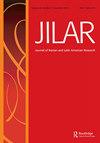Peoples’ Art and Cultural Memory: A Critical Dialogue between Latin America and Oceania
IF 0.3
0 HUMANITIES, MULTIDISCIPLINARY
Journal of Iberian and Latin American Research
Pub Date : 2021-05-04
DOI:10.1080/13260219.2021.1994703
引用次数: 1
Abstract
ABSTRACT Several theoretical positions such as the “Global South” have challenged the developmentalist logic that continues to maintain cultural categorizations as they relate to art in the aftermath of WWII. In the current neoliberal era, the post-1945 developmentalist paradigm has gone even further by instrumentalizing culture itself produced under “conditions of oppression,” primarily to foster public diplomacy and economic benefits. Nation-states face globalization using these categories in order to create an authentic and competitive identity. This article engages in a cross-cultural analysis of arte popular brasileira—in which Brazil belongs to the Global South—and Māori art—in what I call the “southern isles” of Aotearoa New Zealand—both of which function in conditions of coloniality. I identify the implications of the strategies implemented in governmental policies and official institutional spaces for these artistic and cultural expressions.人民的艺术与文化记忆:拉丁美洲与大洋洲的批判性对话
“全球南方”等一些理论立场挑战了发展主义逻辑,这种逻辑在二战后继续保持着与艺术相关的文化分类。在当前的新自由主义时代,1945年后的发展主义范式更进一步,将“压迫条件”下产生的文化本身工具化,主要是为了促进公共外交和经济利益。民族国家利用这些类别来面对全球化,以创造真实和有竞争力的身份。本文对流行的巴西艺术(巴西属于全球南方)和毛利艺术(我称之为新西兰奥特亚的“南方岛屿”)进行了跨文化分析,这两种艺术都在殖民地条件下发挥作用。我确定了政府政策和官方机构空间中实施的战略对这些艺术和文化表达的影响。
本文章由计算机程序翻译,如有差异,请以英文原文为准。
求助全文
约1分钟内获得全文
求助全文
来源期刊

Journal of Iberian and Latin American Research
HUMANITIES, MULTIDISCIPLINARY-
CiteScore
0.60
自引率
0.00%
发文量
22
 求助内容:
求助内容: 应助结果提醒方式:
应助结果提醒方式:


